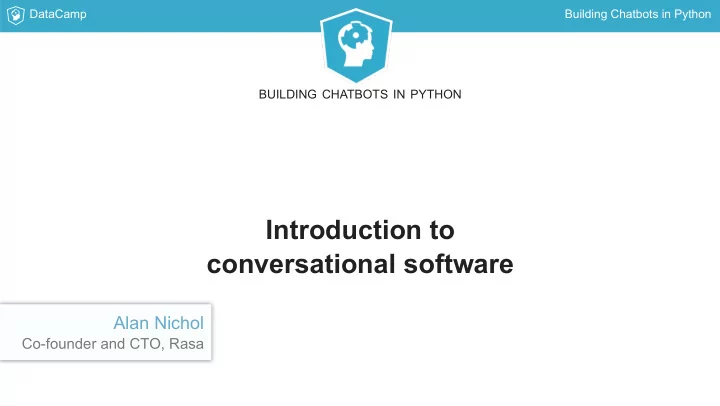

DataCamp Building Chatbots in Python BUILDING CHATBOTS IN PYTHON Introduction to conversational software Alan Nichol Co-founder and CTO, Rasa
DataCamp Building Chatbots in Python A short history Conversational software is not a new idea! Dates back to at least 1960s First wave: command line applications ELIZA: 1966
DataCamp Building Chatbots in Python Course content Implementing smalltalk, ELIZA style How to use regex and ML to extract meaning from free-form text Build chatbots that can Query a database Plan a trip Help you order coffee Handling statefulness
DataCamp Building Chatbots in Python EchoBot I In [1]: USER: Hello! Out[1]: BOT: I can hear you, you said: 'Hello!' In [2]: USER: How are you? Out[2]: BOT: I can hear you, you said: 'How are you?'
DataCamp Building Chatbots in Python EchoBot II In [1]: def respond(message): : return "I can hear you! you said: {}".format(message) In [2]: def send_message(message): : # calls respond() to get response In [3]: send_message("hello!") Out[3]: USER: hello! ...: BOT : I can hear you! you said: hello!
DataCamp Building Chatbots in Python EchoBot III In [1]: import time In [2]: time.sleep(0.5)
DataCamp Building Chatbots in Python BUILDING CHATBOTS IN PYTHON Let's practice!
DataCamp Building Chatbots in Python BUILDING CHATBOTS IN PYTHON Creating a personality Alan Nichol Co-founder and CTO, Rasa
DataCamp Building Chatbots in Python Why personality? Difference between a command line app and a chatbot Makes chatbots and voice assistants more accessible and fun to use Your users will expect it!
DataCamp Building Chatbots in Python Smalltalk In [1]: responses = { : "what's your name?": "my name is EchoBot", : "what's the weather today?": "it's sunny!" : } In [2]: def respond(message): : if message in responses: : return responses[message] In [3]: respond("what's your name?") Out[3]: 'my name is EchoBot'
DataCamp Building Chatbots in Python Including variables In [1]: responses = { : "what's today's weather?": "it's {} today" : } In [2]: weather_today = "cloudy" In [3]: def respond(message): : if message in responses: : return responses[message].format(weather_today) : In [4]: respond("what's today's weather?") Out[4]: "it's cloudy today"
DataCamp Building Chatbots in Python Choosing responses In [1]: responses = { : "what's your name?": [ : "my name is EchoBot", : "they call me EchoBot", : "the name's Bot, Echo Bot" : ] : } In [2]: import random In [3]: def respond(message): : if message in responses: : return random.choice(responses[message]) In [4]: respond("what's your name?") Out[4]: "the name's Bot, Echo Bot"
DataCamp Building Chatbots in Python Asking questions In [1]: responses = [ "tell me more!", "why do you think that?" ] In [2]: import random In [3]: def respond(message): : return random.choice(responses) In [4]: respond("I think you're really great") Out[4]: 'why do you think that?'
DataCamp Building Chatbots in Python BUILDING CHATBOTS IN PYTHON Let's practice!
DataCamp Building Chatbots in Python BUILDING CHATBOTS IN PYTHON Text processing with regular expressions Alan Nichol Co-founder and CTO, Rasa
DataCamp Building Chatbots in Python Regular expressions Match messages against known patterns Extract key phrases Transform sentences grammatically
DataCamp Building Chatbots in Python The regex behind ELIZA USER: "do you remember when you ate strawberries in the garden?" ELIZA: "How could I forget when I ate strawberries in the garden?"
DataCamp Building Chatbots in Python Pattern matching In [1]: import re In [2]: pattern = "do you remember .*" In [3]: message = "do you remember when you ate strawberries in the garden" In [4]: match = re.search(pattern, message) In [5]: if match: : print("string matches!") Out[5]: string matches!
DataCamp Building Chatbots in Python Extracting key phrases In [1]: import re In [2]: pattern = "if (.*)" In [3]: message = "what would happen if bots took over the world" In [4]: match = re.search(pattern, message) In [5]: match.group(0) Out[5]: 'what would happen if bots took over the world' In [6]: match.group(1) Out[6]: 'bots took over the world'
DataCamp Building Chatbots in Python Grammatical transformation In [1]: import re In [2]: def swap_pronouns(phrase): ...: if 'I' in phrase: ...: return re.sub('I', 'you', phrase) ...: if 'my' in phrase: ...: return re.sub('my', 'your', phrase) ...: ...: else: ...: return phrase In [3]: swap_pronouns("I walk my dog") Out[3]: 'You walk your dog'
DataCamp Building Chatbots in Python Putting it all together In [1]: pattern = 'do you remember (.*)' In [2]: message = 'do you remember when you ate strawberries in the garden' In [3]: phrase = pattern.search(pattern, message).group(1) In [4]: phrase Out[4]: 'when you ate strawberries in the garden' In [5]: response = choose_response(pattern) In [6]: response Out[6]: 'how could I forget {}' In [7]: phrase = swap_pronouns(phrase) In [8]: phrase Out[8]: 'when I ate strawberries in the garden' In [9]: response.format(phrase) Out[9]: 'how could I forget when I ate strawberries in the garden'
DataCamp Building Chatbots in Python BUILDING CHATBOTS IN PYTHON Let's practice!
Recommend
More recommend